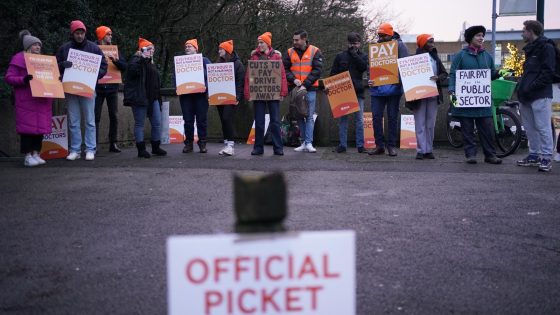Patients face further major disruption as junior doctors in England begin a five-day strike in their ongoing pay row with the government.
Tens of thousands of hospital appointments are set to be cancelled or postponed as a result of the latest walkout which began at 7am on Saturday and will stretch until 11.59pm on Wednesday.
It is the 10th stoppage by junior doctors since last March and follows the longest strike in NHS history in January, which lasted six full days.
“The government could have stopped these strikes by simply making a credible pay offer for junior doctors in England to begin reversing the pay cuts they have inflicted upon us for more than a decade,” Dr Robert Laurenson and Dr Vivek Trivedi, co-chairs of the BMA junior doctors committee, said.
“The same government could have even accepted our offer to delay this round of strike action to give more space for talks – all we asked for in return was a short extension of our mandate to strike.
“The fact that ministers have chosen strike action over what could have been the end of this year’s pay dispute is disappointing to say the least.”
The BMA also expects its strike mandate to be renewed raising the prospect of further industrial action.
Health Secretary Victoria Atkins said: “I want to see doctors treating patients, not standing on picket lines.
“In negotiations with the BMA junior doctors committee, we made it clear we were prepared to go further than the pay increase of up to 10.3% that they have already received. They refused to put our offer to their members.
“More than 1.3 million appointments and operations have already been cancelled or rescheduled since industrial action began – five days of further action will compound this.
“The NHS has robust contingency plans in place, and it is vital that people continue to come forward for treatment. But no one should underestimate the impact these strikes have on our NHS.
“So again, I urge the BMA junior doctors committee to call off their strikes and show they are prepared to be reasonable, so that we can come back to the negotiating table to find a fair way forward.”
Read more on Sky News:
Worst airlines for customer satisfaction revealed
WW2 bomb that forced thousands to evacuate detonated at sea
Junior doctors have received a pay rise averaging nearly 9% this financial year.
The BMA has been seeking a 35% “pay restoration” as its starting position, but has said it is willing to negotiate.
Junior doctors make up around half of all doctors in the NHS and have anywhere up to eight years’ experience working as a hospital doctor, depending on their specialty, or up to three years in general practice.
Click to subscribe to the Sky News Daily wherever you get your podcasts
Wes Streeting, Labour’s shadow health secretary, described the latest round of strikes as having “a devastating impact on patients” but said Prime Minister Rishi Sunak was refusing to negotiate.
NHS national medical director Professor Sir Stephen Powis said it is “extremely concerning” that strike action and disruption “are becoming a new normal”.
“For the equivalent of more than one in every 10 days last year, the NHS has had to effectively stop carrying out most routine appointments to prioritise emergency care,” he added.
Deputy chief executive of NHS Providers Saffron Cordery said: “We can’t go on like this. Wave after wave of strikes saps the morale of staff and impacts patients.
“Trust leaders want to get on with the job of giving patients first-class care instead of having to spend too much time and energy planning for and coping with weeks of disruptive strikes.”
Source Agencies

